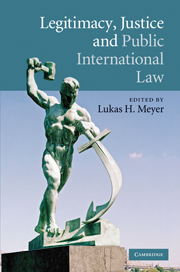Book contents
- Frontmatter
- Contents
- List of contributors
- Acknowledgements
- Introduction: Legitimacy, justice and public international law. Three perspectives on the debate
- 1 The legitimacy of global governance institutions
- 2 Institutionalising global demoi-cracy
- 3 The responsibilities and legitimacy of economic international institutions
- 4 Do international organisations play favourites? An impartialist account
- 5 ‘Victors’ justice'? Historic injustice and the legitimacy of international law
- 6 International law and global justice
- 7 Global justice: Problems of a cosmopolitan account
- 8 The responsibility to protect human rights
- 9 The threat of violence and of new military force as a challenge to international public law
- 10 Forcing a people to be free
- Index
- References
9 - The threat of violence and of new military force as a challenge to international public law
Published online by Cambridge University Press: 03 May 2010
- Frontmatter
- Contents
- List of contributors
- Acknowledgements
- Introduction: Legitimacy, justice and public international law. Three perspectives on the debate
- 1 The legitimacy of global governance institutions
- 2 Institutionalising global demoi-cracy
- 3 The responsibilities and legitimacy of economic international institutions
- 4 Do international organisations play favourites? An impartialist account
- 5 ‘Victors’ justice'? Historic injustice and the legitimacy of international law
- 6 International law and global justice
- 7 Global justice: Problems of a cosmopolitan account
- 8 The responsibility to protect human rights
- 9 The threat of violence and of new military force as a challenge to international public law
- 10 Forcing a people to be free
- Index
- References
Summary
The foundation of a new international public law
After the dark experiences of two destructive world wars in the twentieth century it has been the constitution of the United Nations Organization by which the foundation stone was laid for a positive change in international relations. But even if we have to admit that the UN couldn't meet all political expectations one can recognise a lasting reform of international public law by the UN Charter. It inserted new directions into the framework of international law. The prohibition of a threat or use of military force in international relations – as constituted by UN Charter, article 2, 4 for all member states of the UN – has a deep impact on the legitimate character of the activities and the role of states as well as on the former concept of state sovereignty. While the traditional order of ‘ius gentium’ after the Westphalian Peace Treaty in 1648 did include the legal option for all sovereign states to enter into war against the other members of the international community of states, the UN Charter excludes that right in general, limits the ‘inherent right’ of self-defence of a member state of the UN to the temporal condition ‘until’ the Security Council of the UN has decided on appropriate measures, and transfers the legal questions concerning peace and war to the system of ‘collective security’, represented by the political body of the United Nations itself.
- Type
- Chapter
- Information
- Legitimacy, Justice and Public International Law , pp. 252 - 269Publisher: Cambridge University PressPrint publication year: 2009

